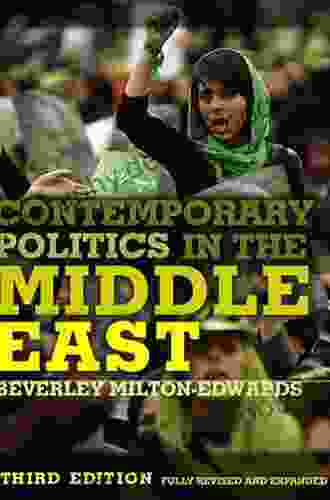Unraveling the Complex Web of Contemporary Politics in the Middle East

The Middle East, a region of rich history, vibrant cultures, and strategic importance, has long been a focal point of global attention and intrigue. In recent decades, the region has undergone a series of profound political and social transformations, shaping its present and casting a significant influence on the international stage.
4.5 out of 5
| Language | : | English |
| File size | : | 5027 KB |
| Text-to-Speech | : | Enabled |
| Enhanced typesetting | : | Enabled |
| Word Wise | : | Enabled |
| Print length | : | 368 pages |
| Lending | : | Enabled |
| Screen Reader | : | Supported |
Geopolitical Dynamics and Regional Conflicts
The Middle East is a complex mosaic of diverse nations, each with its unique political system, cultural heritage, and economic trajectory. These factors, coupled with the presence of rich natural resources, have often led to geopolitical tensions and regional conflicts.
One of the most enduring conflicts in the Middle East is the Arab-Israeli dispute. This conflict has its roots in historical, religious, and territorial claims, and has been a source of instability in the region for decades. In recent years, the peace process between Israel and the Palestinians has faced numerous challenges, further complicating the already volatile situation.
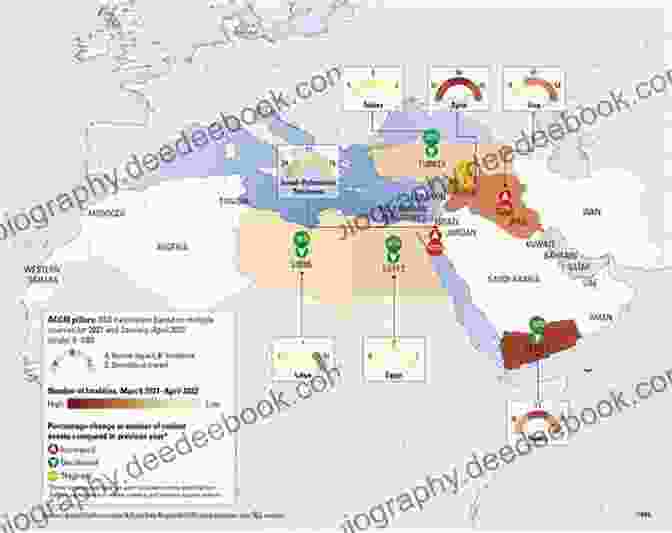
Other conflicts that have shaped the political landscape of the Middle East include the ongoing civil war in Syria, the Yemeni civil war, and the instability in Iraq following the U.S. invasion in 2003. These conflicts have created humanitarian crises, displaced millions of people, and fueled the rise of extremist groups such as ISIS.
The geopolitical dynamics of the Middle East are also influenced by the presence of external powers such as the United States, Russia, and Iran. These powers have their own strategic interests in the region, and their involvement can often exacerbate existing tensions or create new ones.
The Arab Spring and its Aftermath
The Arab Spring, a wave of pro-democracy protests that swept across the Middle East and North Africa in 2011, marked a significant turning point in the region's political history. The protests were triggered by a combination of economic grievances, political repression, and the desire for greater freedom and participation.
While the Arab Spring initially brought about hope for political change, its aftermath has been complex and often tumultuous. Some countries, such as Tunisia, have successfully transitioned to democracy, while others, such as Egypt, have faced setbacks and returned to authoritarian rule. The legacy of the Arab Spring continues to shape the political discourse and aspirations of people in the Middle East.
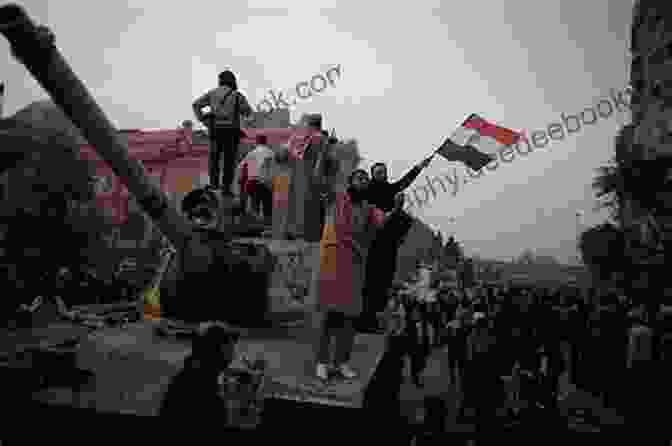
Technology and Globalization
The Middle East, like other regions around the world, has been profoundly impacted by the rise of technology and globalization. Social media platforms have emerged as powerful tools for communication and mobilization, playing a significant role in the Arab Spring and subsequent political movements.
However, the spread of technology has also brought new challenges. The proliferation of fake news and propaganda has created a complex information landscape, making it more difficult for people to discern accurate information and make informed decisions. Additionally, the growth of global trade and investment has created economic opportunities but also increased the region's vulnerability to external economic shocks.
The intersection of technology and globalization continues to shape political discourse and dynamics in the Middle East, both presenting opportunities and posing challenges for governments and citizens alike.
Economic Development and Human Rights
Economic development and human rights are intricately linked to the political landscape of the Middle East. While some countries in the region have experienced significant economic growth, others continue to struggle with poverty, inequality, and unemployment.
The pursuit of economic development has often come at the expense of environmental protection, leading to concerns about sustainability and the long-term well-being of the region. Additionally, human rights concerns such as political repression, freedom of speech, and gender equality remain pressing issues in many Middle Eastern countries.
Striking a balance between economic development, environmental sustainability, and human rights is a critical challenge for governments in the Middle East. The success of political systems and the stability of the region will depend on their ability to address these complex issues.
The contemporary politics of the Middle East are a tapestry of geopolitical dynamics, regional conflicts, social movements, and the transformative influences of technology and globalization. The region continues to navigate complex challenges, from the unresolved Arab-Israeli conflict to the rise of extremism and the ongoing struggle for economic development and human rights.
Understanding the intricate web of contemporary politics in the Middle East is essential for navigating the complexities of the region and its impact on global affairs. As the region continues to evolve, it remains a vital area of study and engagement for policy makers, scholars, and anyone seeking to make sense of the rapidly changing world around us.
4.5 out of 5
| Language | : | English |
| File size | : | 5027 KB |
| Text-to-Speech | : | Enabled |
| Enhanced typesetting | : | Enabled |
| Word Wise | : | Enabled |
| Print length | : | 368 pages |
| Lending | : | Enabled |
| Screen Reader | : | Supported |
Do you want to contribute by writing guest posts on this blog?
Please contact us and send us a resume of previous articles that you have written.
 Chapter
Chapter Text
Text Genre
Genre Reader
Reader Paperback
Paperback Magazine
Magazine Sentence
Sentence Bookmark
Bookmark Shelf
Shelf Glossary
Glossary Foreword
Foreword Preface
Preface Synopsis
Synopsis Annotation
Annotation Footnote
Footnote Codex
Codex Tome
Tome Classics
Classics Biography
Biography Autobiography
Autobiography Memoir
Memoir Encyclopedia
Encyclopedia Dictionary
Dictionary Thesaurus
Thesaurus Narrator
Narrator Resolution
Resolution Catalog
Catalog Stacks
Stacks Archives
Archives Reserve
Reserve Reading Room
Reading Room Rare Books
Rare Books Special Collections
Special Collections Interlibrary
Interlibrary Thesis
Thesis Dissertation
Dissertation Awards
Awards Reading List
Reading List Theory
Theory Textbooks
Textbooks Jo Sgammato
Jo Sgammato David H Petraeus
David H Petraeus Naomi Novik
Naomi Novik Rebekah Farrugia
Rebekah Farrugia J L Hickey
J L Hickey Laura Morelli
Laura Morelli Richard Schweid
Richard Schweid David Sheerin
David Sheerin Arielle Crowell
Arielle Crowell Adrien Depeursinge
Adrien Depeursinge Philip L Martin
Philip L Martin James D Halderman
James D Halderman Carolyn Maull Mckinstry
Carolyn Maull Mckinstry A J Coates
A J Coates Michael M Carter
Michael M Carter C D Blue
C D Blue Cleo Paskal
Cleo Paskal Loraine Cole
Loraine Cole Gerald Yeung
Gerald Yeung Bob Tyson
Bob Tyson
Light bulbAdvertise smarter! Our strategic ad space ensures maximum exposure. Reserve your spot today!

 Ibrahim BlairHow Builders and Remodelers Can Leverage Their Own Online Media to Attract...
Ibrahim BlairHow Builders and Remodelers Can Leverage Their Own Online Media to Attract...
 Dave SimmonsCovington Billionaires Romance Box Sets: Escape into a World of Opulence and...
Dave SimmonsCovington Billionaires Romance Box Sets: Escape into a World of Opulence and...
 Dwight BellTime Flies: Uncovering the Significance of the Mayflower Compact and Virginia...
Dwight BellTime Flies: Uncovering the Significance of the Mayflower Compact and Virginia... Clark CampbellFollow ·19k
Clark CampbellFollow ·19k Emilio CoxFollow ·8k
Emilio CoxFollow ·8k J.R.R. TolkienFollow ·16.8k
J.R.R. TolkienFollow ·16.8k Osamu DazaiFollow ·5.1k
Osamu DazaiFollow ·5.1k Jamal BlairFollow ·13.2k
Jamal BlairFollow ·13.2k Isaac MitchellFollow ·13.1k
Isaac MitchellFollow ·13.1k Yukio MishimaFollow ·13.4k
Yukio MishimaFollow ·13.4k Jett PowellFollow ·7.3k
Jett PowellFollow ·7.3k
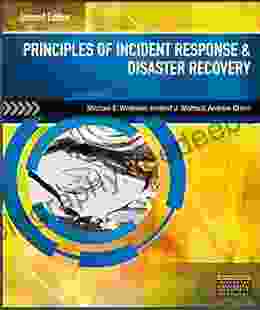
 Franklin Bell
Franklin BellSecond Edition Pdf No Audio: A Comprehensive Guide to the...
The Second Edition...
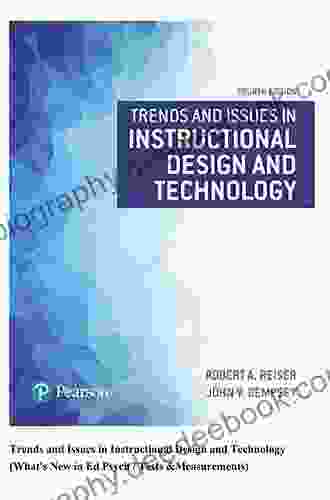
 Jackson Blair
Jackson BlairTrends and Issues in Instructional Design and Technology
Instructional...

 Mario Vargas Llosa
Mario Vargas LlosaEnchanting Enigma Variations and Triumphant Pomp and...
The Enigma Variations: A...

 Dwight Blair
Dwight BlairTime Between Us: A Novel That Explores the Power of...
Prepare to be swept away by...
4.5 out of 5
| Language | : | English |
| File size | : | 5027 KB |
| Text-to-Speech | : | Enabled |
| Enhanced typesetting | : | Enabled |
| Word Wise | : | Enabled |
| Print length | : | 368 pages |
| Lending | : | Enabled |
| Screen Reader | : | Supported |


